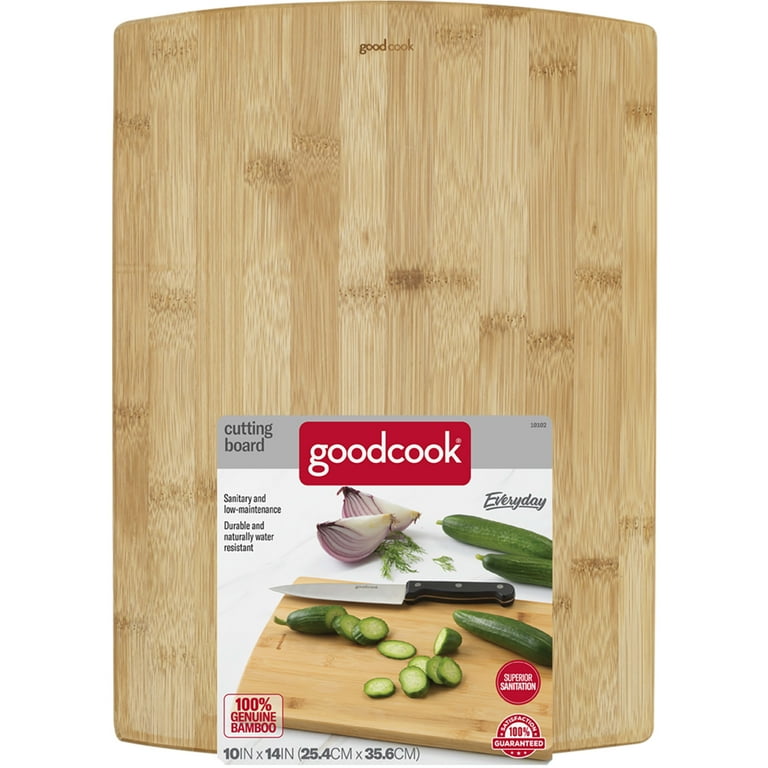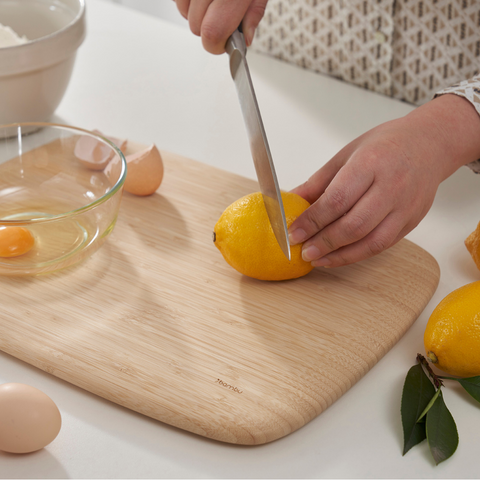Are bamboo cutting boards sanitary? This is a question that might pop into your mind while you’re busy prepping meals in the kitchen.
You want to make sure that the surfaces you use are not just practical, but also safe for your family. Bamboo cutting boards are popular for their eco-friendly nature, but do they truly safeguard against germs and bacteria? Picture this: a cutting board that’s not only stylish but also keeps your food prep safe.
Imagine the confidence you’ll have knowing you’re using a product that supports your health and wellness. This article will dive into the facts, dispelling myths and revealing truths about bamboo cutting boards. By the end, you’ll be equipped with the knowledge you need to make informed decisions for your kitchen. Keep reading to discover if bamboo cutting boards are the sanitary choice you’ve been searching for.
Bamboo Cutting Board Basics
Bamboo cutting boards have become a popular choice in kitchens today. They offer durability and a natural look that appeals to many. But are they sanitary? Understanding the basics of bamboo cutting boards can help answer this question.
Bamboo Is Naturally Antimicrobial
Bamboo has natural antimicrobial properties. This means it can resist bacteria growth better than some other materials. The dense surface of bamboo doesn’t allow bacteria to penetrate easily.
Durability And Maintenance
Bamboo boards are hard and durable. They don’t scratch easily, keeping their surface smooth. Regular maintenance includes washing with warm water and mild soap. This helps keep them clean and sanitary.
Eco-friendly Choice
Bamboo is a sustainable resource. It grows quickly and can be harvested without damaging the environment. Choosing bamboo supports eco-friendly practices. It contributes to a healthier planet.
Aesthetic Appeal
Bamboo cutting boards have a natural, attractive look. Their unique grain patterns add beauty to any kitchen. They blend well with various kitchen styles.
Proper Care Tips
For long-lasting use, dry bamboo boards thoroughly after washing. Avoid soaking them in water. Apply mineral oil occasionally to keep them from drying out. Proper care ensures they remain sanitary.

Credit: gimmethegoodstuff.org
Material Properties
Bamboo cutting boards are a popular choice due to their durability and eco-friendly nature. These boards have a natural resistance to bacteria, making them a sanitary option for kitchen use. Regular cleaning and proper maintenance ensure they remain safe for food preparation.
When considering kitchen hygiene, the material properties of your cutting board play a critical role. Bamboo cutting boards have gained popularity, but are they sanitary? Understanding the unique characteristics of bamboo can help you make an informed decision about your kitchen tools. Let’s dive into the material properties that make bamboo a compelling choice.Natural Antimicrobial Qualities
Bamboo is renowned for its natural antimicrobial properties, which can inhibit bacterial growth. This means that harmful bacteria like E. coli and salmonella are less likely to thrive on bamboo surfaces compared to other materials. Imagine cutting raw chicken on your bamboo board without the lingering worry of bacteria. In my own kitchen, I switched to a bamboo cutting board and noticed fewer instances of cross-contamination. It’s not foolproof, but it does provide an extra layer of protection. Wouldn’t you feel more at ease knowing your cutting board helps keep your kitchen safer?Durability And Hardness
Bamboo cutting boards are incredibly durable and hard. This toughness makes them resistant to knife marks, which can harbor bacteria. A smooth surface is easier to clean and maintains its integrity longer than softer woods. In practice, I’ve noticed my bamboo board stays looking new even after heavy use. The hard surface has saved me from constantly replacing worn-out boards. Have you ever found yourself frustrated by deep grooves in your cutting board? Bamboo’s durability means it can withstand the rigors of daily cooking. This makes it a practical choice for those who cook often. Plus, it’s an investment in a safer cooking environment. Incorporating a bamboo cutting board into your kitchen might be the smart, sanitary choice you’re looking for. With its natural antimicrobial qualities and impressive durability, bamboo stands out as a material that supports both hygiene and longevity.Hygiene Practices
Ensuring proper hygiene practices is crucial when using bamboo cutting boards. While bamboo is naturally antimicrobial, maintaining its cleanliness requires specific attention. Let’s delve into the essential steps you can take to keep your bamboo cutting boards sanitary and safe for food preparation.
Proper Cleaning Techniques
Cleaning your bamboo cutting board after each use is vital. Warm, soapy water is your best friend here. Scrub the board thoroughly to remove any food particles.
Rinse it well with hot water and dry it immediately with a clean towel. This prevents water from soaking into the wood, which can lead to bacteria buildup.
Occasionally, you can also use a mixture of vinegar and water for a deeper clean. This natural solution helps eliminate odors and adds an extra layer of sanitation.
Avoiding Cross-contamination
Cross-contamination is a serious concern in any kitchen. Use separate cutting boards for different types of food, such as meats and vegetables.
Labeling boards or using color-coded ones can help you avoid confusion. This ensures that raw meat juices don’t end up on your salad ingredients.
Have you ever thought about the surfaces your cutting board touches? Make sure the counters are clean before placing the board down. This simple step can prevent germs from transferring onto your board.
Incorporating these hygiene practices into your kitchen routine can enhance your cooking experience. Not only do they keep your bamboo cutting boards sanitary, but they also protect your health. Are you ready to make these practices a part of your daily cooking habits?

Credit: www.walmart.com
Comparing With Other Materials
Bamboo cutting boards are often more sanitary than plastic and wooden ones. They resist deep cuts, reducing bacteria buildup. Their non-porous surface makes cleaning easier and safer for food preparation.
When choosing a cutting board, many people wonder about the best material for hygiene and durability. Bamboo cutting boards are gaining popularity, but how do they stack up against traditional wood and plastic options? Let’s dive into the specifics and see how bamboo compares with other materials.Wood Vs. Bamboo
Wooden cutting boards have been a staple in kitchens for centuries. They are known for their durability and ability to self-heal from cuts and scratches. However, they can be prone to retaining moisture, which may lead to bacteria growth if not properly maintained. Bamboo, on the other hand, offers a harder surface than most wood types, making it more resistant to knife marks and less likely to harbor bacteria. Its natural antimicrobial properties add an extra layer of protection. Have you ever noticed how bamboo boards seem to dry faster after washing compared to wood? This can be a game-changer if you’re worried about hygiene.Plastic Vs. Bamboo
Plastic cutting boards are often praised for their affordability and the ability to pop them in the dishwasher for a thorough clean. However, they can easily develop deep grooves from knife cuts, creating perfect hiding spots for germs. Bamboo boards, while not dishwasher safe, are less prone to deep cuts due to their dense fibers. They require a bit more care, like regular hand washing and occasional oiling, but this can be a small price to pay for a cleaner kitchen surface. Have you ever considered the environmental impact too? Bamboo is a sustainable resource, growing rapidly without the need for pesticides. So, which cutting board material do you think fits your kitchen needs best? The choice between bamboo, wood, and plastic might just boil down to how much you value sustainability and ease of maintenance.Expert Opinions
Experts generally agree that bamboo cutting boards are sanitary due to their hard surface. They resist deep cuts, reducing bacteria growth. Regular cleaning and proper maintenance are still essential to ensure hygiene.
When it comes to kitchen essentials, bamboo cutting boards often spark debate about their sanitary nature. Expert opinions can provide clarity on whether bamboo cutting boards are truly safe for your culinary adventures. In this section, we’ll explore insights from chefs and scientific studies to shed light on this topic.Chef Perspectives
Many chefs appreciate bamboo cutting boards for their durability and natural antimicrobial properties. Bamboo is harder than traditional wood, which means it’s less likely to develop deep grooves that trap bacteria. Chefs often emphasize the importance of proper maintenance. Regular cleaning with soap and water is crucial, but some experts suggest using a vinegar solution for an extra layer of sanitation. Think about how a chef in a busy restaurant keeps their cutting board clean and functional amidst the chaos. Could these methods work in your kitchen too?Scientific Studies
Scientific studies offer intriguing insights into the sanitary nature of bamboo cutting boards. Research has shown that bamboo contains natural antimicrobial agents that can inhibit bacterial growth. One study found that bacteria on bamboo surfaces had a lower survival rate compared to plastic. This suggests bamboo’s natural properties may provide an added layer of protection. Consider how these findings might influence your choice. Would you feel more confident using a bamboo cutting board knowing it may have some built-in defenses? Choosing kitchen tools is more than just aesthetics or convenience. Understanding the expert opinions about bamboo cutting boards can help you make informed decisions for a healthier kitchen environment.
Credit: www.healthierhomes.com
Maintenance Tips
Maintaining bamboo cutting boards is crucial for keeping them sanitary. Proper care can extend their lifespan and ensure safe food preparation. Discover simple tips to keep your bamboo cutting boards in top condition.
Regular Oil Treatment
Bamboo cutting boards benefit from regular oil treatments. Apply food-safe mineral oil every few weeks. This prevents the board from drying out and cracking. Oil creates a protective barrier against moisture. It also helps maintain the board’s natural luster. Use a clean cloth to apply the oil evenly. Let the board absorb the oil for several hours before use.
Storage Recommendations
Store bamboo cutting boards in a dry area. Avoid placing them near heat sources or direct sunlight. Excessive heat can cause warping. Ensure the board is upright when storing. This allows air to circulate around it. Proper air circulation prevents mildew and mold growth. Never store a wet cutting board; dry it thoroughly first.
Environmental Impact
Bamboo cutting boards are known for their durability and aesthetic appeal. But what about their environmental impact? Bamboo is a sustainable material that contributes positively to the environment. It grows quickly and requires minimal resources. This makes it a preferred choice for eco-conscious consumers.
Sustainability Benefits
Bamboo is a renewable resource. It grows faster than most trees. This rapid growth reduces the strain on the environment. Bamboo forests can be harvested in just a few years. Unlike hardwoods, which can take decades to mature. Bamboo’s growth rate contributes to its sustainability. It does not need replanting after harvest. New shoots grow naturally from the roots. This helps maintain soil health and prevents erosion.
Bamboo Harvesting Practices
Bamboo harvesting is an eco-friendly process. Farmers use minimal water and pesticides. This reduces chemical runoff into nearby water sources. Bamboo harvesting does not involve deforestation. It allows for continuous growth without damaging ecosystems. Proper harvesting techniques ensure a sustainable supply. These practices protect wildlife habitats and biodiversity. Responsible harvesting is crucial for maintaining bamboo’s ecological balance.
Frequently Asked Questions
What Are The Disadvantages Of Bamboo Cutting Boards?
Bamboo cutting boards can dull knives faster due to their hardness. They may warp if not dried properly. Some boards contain glue or chemicals, which could leach into food. Bamboo is less resistant to heat and scratches compared to other materials.
Regular oiling is needed to maintain their condition.
Do Bamboo Cutting Boards Get Bacteria?
Bamboo cutting boards resist bacteria due to their natural antimicrobial properties. Proper cleaning and maintenance enhance hygiene. Use hot, soapy water for cleaning and dry thoroughly to prevent bacterial growth. Regularly applying mineral oil helps maintain the board’s condition and reduces the risk of bacteria accumulating.
What Is The Most Sanitary Cutting Board?
Plastic cutting boards are the most sanitary option. They are non-porous and easy to clean. Regularly sanitize them in the dishwasher or with hot soapy water. Avoid deep grooves where bacteria can hide. Replace them when worn out for optimal hygiene.
Can You Sanitize A Bamboo Cutting Board?
Yes, sanitize bamboo cutting boards using white vinegar or hydrogen peroxide. Scrub gently, rinse, and dry completely. Avoid soaking to prevent warping. Regular cleaning maintains hygiene and longevity. Use food-safe mineral oil to preserve and prevent cracks. Keep your bamboo cutting board clean for safe food preparation.
Conclusion
Bamboo cutting boards are a safe choice for your kitchen. Their natural hardness resists knife marks. This reduces bacteria growth. They also absorb less moisture. This helps prevent warping and cracking. Regular cleaning keeps them hygienic. Just wash with soap and water.
Dry thoroughly to maintain their quality. Bamboo is eco-friendly too. It grows quickly and is renewable. Choosing bamboo supports sustainable practices. So, a bamboo cutting board is not only sanitary. It’s a smart and green choice for your home.


